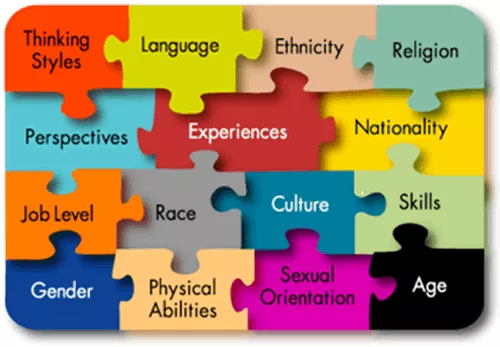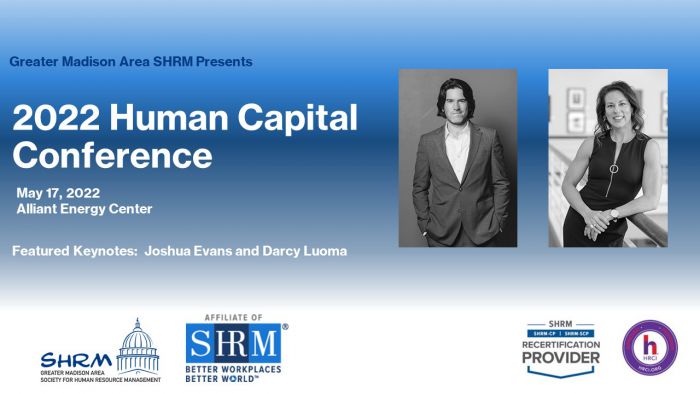April
|
HR InTouchThe Monthly Newsletter of the Greater Madison Area SHRM |
||||||||||||||||||||||||||||||||||||||||||||||||
In This EditionPresident's Message COVID-19 Resources Information for Madison Area HR Professionals Government Affairs & Legal Updates Documentation of Performance Issues is Essential Even When Employees are on Protected Leave Recruitment & Retention Stop doing these things to get more job applications from great candidates Professional Development Spotlight Human Capital Conference Committee Grow Personally and Professionally as a Volunteer Over 100 Already Registered! May 17th Human Capital Conference! Roundtables Return Virtual to Start 2022! Workforce Readiness, Diversity & Inclusion Volunteers Sought for Resume and Interview Tips at DWD Job Fair Monthly Wisconsin Department of Workforce Development - Helpful Links: Hours and Times of Day Minors May Work in Wisconsin Diversity Observances in April
Our 2022 Student Scholarship Winners! Welcome New Members!
|
Greetings, GMA SHRM Members and HR Professionals! Click here to view the full GMA SHRM Board of Directors
Information for Madison Area HR ProfessionalsGMA SHRM HR COVID-19 Resource Page This page has direct links to:
Government Affairs & Legal Updates Documentation of Performance Issues is Essential Even When Employees are on Protected Leave
|
||||||||||||||||||||||||||||||||||||||||||||||||
%20(A2904780x9DEB4)_135x169.JPG) Brian P. Goodman |
 Sarah J. Horner  Storm Larson |
 A recent decision from the Seventh Circuit Court of Appeals emphasizes the importance of consistently and thoroughly documenting an employee’s performance issues if the employee is on a legally protected form of leave or has recently returned from legally protected leave. The case is Anderson v. Nations Lending Corporation.
A recent decision from the Seventh Circuit Court of Appeals emphasizes the importance of consistently and thoroughly documenting an employee’s performance issues if the employee is on a legally protected form of leave or has recently returned from legally protected leave. The case is Anderson v. Nations Lending Corporation.
Ms. Andersen worked as an Underwriting Auditor for a residential mortgage lender, Nations Lending Corporation (NLC) beginning in 2017. In her first year of employment, NLC noticed that Ms. Andersen had performance deficiencies and was making errors. Due to health issues, she took an extended leave from October 2017 to January 2018. While she was off work, NLC learned of additional performance issues and errors. In March 2018, Ms. Andersen began FMLA leave. While she was out on leave, NLC discovered even more errors in her loans. At that point, NLC began a formal investigation into Ms. Andersen’s performance issues. Ms. Andersen returned from FMLA on June 11, 2018. On June 14, 2018, NLC completed its investigation and terminated her employment. She sued NLC for violations of the ADA and the FMLA.
The district court ruled in favor of NLC, and that decision was affirmed on appeal. The court held that NLC provided ample evidence of a non-discriminatory and non-retaliatory rationale for Ms. Anderson’s termination. Ms. Anderson did not provide any evidence to refute NLC’s rationale or demonstrate that the rationale was pretext for discrimination. Ms. Andersen did not contest that she made mistakes, nor could she demonstrate that NLC exaggerated the severity of minor errors. She also couldn’t establish any impropriety or shortcoming in NLC’s investigation. Therefore, the court held that Ms. Andersen’s claims failed as a matter of law.
Employers are often hesitant to terminate employees for poor performance or conduct reasons that are discovered while employees are on legally protected leave. While such situations should be handled cautiously, employers should not hesitate to investigate significant performance or conduct issues that arise, even if they arise or are discovered while an employee is on protected leave. Employers should nonetheless be aware that the timing of an adverse employment action may increase the risk that employees bring discrimination and retaliation claims. Therefore, employers should work with legal counsel and conduct a carefully documented and thorough investigation of the employee’s performance and misconduct issues. This will reduce the risk of a successful claim of discrimination or retaliation
Return to Top
Stop doing these things to get more job applications from great candidates
Submitted by GMA SHRM member Justin Vajko Principal & Chief Strategy Guy at Dialog Design Co/
Justin is also a presenter at our May 17th Human Capital Conference.
 |
I come from a background in marketing and online advertising, where any gaps in the customer experience are dealt with swiftly in order to avoid missing out on a sale.
So you can imagine my surprise when I started working with blue collar HR teams who had no idea just how hard they were making it for potential candidates to apply to their jobs. We'd give our clients an advertising campaign and get them a huge amount of clicks and visitors to their hiring pages, only to see virtually no uptick in applications. So why were our efforts seemingly failing?
Turns out, there are many opportunities for a candidate to fall through the cracks between when they find out about your company and successfully apply.
Here are the top three mistakes I see employers make when it comes to getting job applications.
1. Requiring candidates to create an account to apply
When's the last time you tried applying to your own job? Odds are there's at least one thing you can improve, especially if you're gating your applications. That means you're requiring folks to create a username and password just to apply to your job. The best way for me to explain just how bad of an experience this is for your users is by likening it to online shopping. Think back to the last time you found something online you were planning on buying from a new website. Did they ask you to create an account just to purchase it? Online stores these days have gotten smarter after they realized they were losing out on so many customers by trying to make them create accounts to make a purchase. Now you can often check out as a guest, which makes the process so much faster and smoother.
But I hear what you're thinking: if we make it more difficult for someone to apply, won't that cause only the most dedicated people to apply? Unfortunately that's not true. Think about it: your best candidate, if they're good, will know they have a lot of options. Why would they pause to spend 15-30 minutes on your specific position when they can have the pick of the litter? Make it easy for everyone to apply and you'll find the rockstar candidates in the mix.
Time to apply matters too. In fact, studies have shown that shortening your job application speed to under 5 minutes can increase job applications by over 365%. By not gating your job application, you'll make it easy and fast for candidates to apply to your jobs. And you'll see your application numbers rise.
2. Not including pay in the job description
Let's keep rolling with the online store example. Have you ever found the exact item you were looking for in an online store but in order to find out how much shipping was, you had to go through the checkout process? It's frustrating, right?
Imagine how much more frustrating it is for your potential candidate to have to apply to your job, take weeks to hear from you, then meet with you only to discover in the second interview how much the pay is. You'd never purchase something if you had to go through that much hassle to find out the price. Yet we expect candidates to the same.
Hiding pay until you talk with a candidate may have worked even just a few months ago. Remember the days when you could put out a job post and get great candidates to apply? Unfortunately because it's now an employee market (aka the candidates have the choice of where they want to work), you need to take a more transparent approach to your pay if you want any chance at getting applications from decent candidates.
Don't worry about whether your competitors will match your pay. You shouldn't be advertising your pay as the only reason why people would want to work for you anyways -- culture, flexible schedules, and purpose are other major motives for choosing to work somewhere. Including pay in the job description shows you're not going to waste your candidate's time or your time when they find out it wasn't what they were looking for. Plus, candidates will know what they're getting into before they apply, making it less likely they'll ghost you down the road.
That's why we always recommend making your pay public, even if it's not the best.
3. The job description isn't interesting
Poor HR folks have so many jobs these days, so we really can't blame them for not writing job descriptions that are interesting to read. A job description should be a convincing argument about why someone should work for you -- not a list of requirements. You should be mentioning the benefits, perks, and culture within your org. You should tap into the motivations of your ideal candidate and tie those into your position. For example, if you're hiring an introverted technical worker, they'll want something different out of a job than if you're hiring an extroverted sales person.
Another problem with job descriptions that we see all the time is that they're simply too long. If your job description for a non-managerial position is more than a page long in Word, you're doing something wrong. And don't cheat by making the font really small! Take out items that are simply a given: don't tell people they have to keep their work area clean or be good at listening. Those things you can find out from them later in an interview or a work test. Keep your job description just about the unique highlights of the position.
A third mistakes we see is to make the job sound too complicated by using jargon and technical speak. This is especially true of jobs in industries where you can expect to get applications from outside your industry (I'm looking at you, manufacturing). Sometimes you do need to mention specific machines. But try to explain what someone's going to be doing as if you're explaining it to a 5th grader. This will give folks from outside your industry more confidence in saying "yes" to applying to the job.
Conclusion
To summarize, here are three steps you can take to improve your candidate experience:
- Try to apply to your most in-demand job as if you were a candidate. You'll quickly discover how long it takes and how complicated it is. In fact, you might even discover parts of the application are broken and weren't reported.
- Don't require candidates to create an account to apply to your company. And keep your applications short. Remember, the goal isn't to get all the info. It's to get just enough for the first interview.
- Include pay or starting pay in the job description. Don't make your candidates jump through hoops to find out the pay wasn't what they needed. That will just waste their time and yours. Make sure your job descriptions are more like a tour of the position instead of a list of requirements. That means keep them interesting and only highlight what matters. And unless you're the US government, keep them short! Try to shoot for under one page in Word.
While these changes can solve some of your problems with getting enough good applications, they're only part of the battle. Make sure you're being proactive with your recruiting by getting in front of candidates with online ads, videos, and getting your reviews in line with reality.
If you want some help with getting proactive with your recruiting (aka selling the job), we can help! Visit our Contact page to get in touch for pricing and a walk-through of how we can help.
More Information
Return to Top
Spotlight Human Capital Conference Committee
 Here we are in another new year…and a lot has changed again! While the past two years have presented so many challenges, we are so grateful to our GMA SHRM members and community for pivoting with us as we were tasked with continuing the great work of networking and connecting in a newly virtual world.
Here we are in another new year…and a lot has changed again! While the past two years have presented so many challenges, we are so grateful to our GMA SHRM members and community for pivoting with us as we were tasked with continuing the great work of networking and connecting in a newly virtual world.
Some of you are transitioning back to working on-site, some have been on-site for the several months…and some will remain virtual all or part of their work time for the foreseeable future. What doesn’t necessarily change is the need to connect, whether it is in-person or in a virtual format.
For the first time since spring of 2020, we are excited to offer the 2022 GMA Human Capital Conference (HCC) as the first in-person programming event! The GMA SHRM Board and the HCC Committee have lined up an impressive and impactful line-up of keynote speakers and breakout programs to the Wisconsin human resources community. The GMA SHRM Annual HCC offers meeting attendees relevant human resources content on issues including compensation, government affairs, innovative recruiting ideas and DEI techniques in an entertaining atmosphere that is conducive for networking.
Highlights are our keynote speakers Joshua Evans (morning keynote session Purpose or Perish and lunch keynote session Change Engage and Evolve) and Darcy Luoma (late morning keynote session Thoughtfully Fit®: Solve Your People Problems with Confidence).
As we start our planning for 2023 HCC, we are always looking to add to our group of talented and amazing volunteers! If you’d like to learn more about this committee and how you might benefit from volunteering for the GMA SHRM Human Capital Conference, please feel free to email me at anita.herrick@wisc.edu with any questions.
Return to Top
Submitted by Sarah Hart, GMA SHRM Director of Media Relations
 Sarah Hart |
I first joined GMA SHRM when I returned to the HR field about four years ago as a way to stay educated in the HR field. I received so much more than I expected - the training was excellent, but I also got the opportunity to network and meet so many amazing people. I knew I wanted to get involved, so I became the Newsletter Coordinator and joined the HCC committee, where I got to know the board members and see first hand how much work goes into planning the many events that GMA SHRM holds.
For the last year I've served as the Director of Media Relations, managing the newsletter process and social media. Being on the board has opened my eyes to how dedicated our volunteers truly are in our chapter. I feel lucky to have the opportunity to work with such gifted, driven, and compassionate people. There are so many ways you can volunteer at GMA SHRM. If you are interested in hearing more, any of us board members would love to chat with you!
Networking. Paying it forward. Future HR Leaders.
Return to Top
May 17th Human Capital Conference Early Registration Now Open!
GMA SHRM is excited to announce its 17th Annual Human Capital Conference will return in person on Tuesday, May 17, 2022 at the Alliant Energy Center in Madison, WI!
Today’s world and workplace are changing in ways we could never imagine. This disruption is taking a major toll in productivity and engagement regardless of role or industry. Many leaders are struggling to realign and maintain enthusiasm within their organization.
The 2022 Human Capital Conference will help you find solutions to today's HR issues and to celebrate our first live program in over 2 years we are featuring 2 amazing keynote presenters!
Featured Keynote Presenters:
Joshua Evans
leading expert on company culture and organizational engagement.
Darcy Luoma
inspiring motivational speaker.
|
|
| Finding Talent: 3 Key Factors to Building Your Reputation as an Employer of Choice – Justin Vajko Mastering the Art of Delegation: Effectively Leveraging the Talents of Your Team - Jeffrey Russell Compensation in a Post Pandemic World - Rena Somersan DEI: Challenges and Success Stories From the Field - Local HR Experts Annual HR Legal Update - Jennifer Mirus and Brian Goodman |
Roundtables Return Virtual for 2022!
HR Advice Network Roundtables are informal, peer-led discussions facilitated under the auspices of the GMA SHRM Programming Committee. The focus of the roundtables are to support GMA SHRM members who are either HR professionals or individuals who may have HR responsibilities within their organizations. Members come together to address and discuss their emerging HR challenges, in an open forum format, by sharing information, seeking advice, providing support and tangible resources to one another by exploring best practices.
These Roundtables are designed for those professionals who are interested in sharing their ideas and experiences in a confidential environment. It is expected what members share in these roundtables will stay within the roundtable. We encourage members to exchange business cards and reach out to each other outside of these meetings to expand on the discussions.
A special thank you to our Rountable facilitators Dawn Koopman, Tracy Niesen Breunig, and Melissa Chadwick!
More information.
Return to Top
Volunteers Sought for Resume and Interview Tips at DWD Job Fair
Submitted by Jennifer Brikowski, The State of Wisconsin, Department of Workforce Development, Director – Workforce Readiness Director
DWD is hosting an in-person job fair at the Warner Park Community Center on Tuesday, May 3rd. We are looking for a few members to volunteer one or two hours to assist job seekers with their resume or interviewing skills. We need volunteers from 1:30pm to 4pm. If you are interested in volunteering, please send an email to Jennifer.brikowski@dwd.wisconsin.gov. Thank you!
If you are interested in learning more about us or joining our great group, please send me an email! Jennifer.brikowski@dwd.wisconsin.gov
Monthly Wisconsin Department of Workforce Development - Helpful Links
Hours and Times of Day Minors May Work in Wisconsin
https://dwd.wisconsin.gov/dwd/publications/erd/pdf/erd-9212-p.pdf
Wisconsin DEPARTMENT OF WORKFORCE DEVELOPMENT -
Return to Top
Diversity Observances in April
Submitted by Mary Vesely, Employee Engagement & Inclusion Manager at Fairway Independent Mortgage Corporation and GMA SHRM Director of Diversity
 Why not have fun, celebrate diversity, learn about each other, and use these observances as themes to engage your team!
Why not have fun, celebrate diversity, learn about each other, and use these observances as themes to engage your team!
- Diversity Month
- Scottish-American Month
- National Autism Awareness Month
- National Minority Health Month
- Ramadan: April 2 - May 2
- Easter: April 17
- National Pet Day: April 11
Check out our DEI Resources Page for helpful resources! Stay tuned for semi-annual updates on our downloadable document. We welcome any ideas/suggestions.
Return to Top
 Our 2022 Student Scholarship Winners!
Our 2022 Student Scholarship Winners!
Congratulations to the #GMASHRM student scholarship winners Rachel Petermann and Jordyn Dellis! Rachel and Jordyn were awarded for their dedication to pursuing a career in HR, as well as their leadership and academic excellence. Well done, Rachel and Jordyn!
If you know of an inspiring student pursuing a career in HR, encourage them to apply to the GMA SHRM’s Student Scholarship and to become a student member of GMA SHRM.
A big shout out to the committee members who helped make this scholarship possible, including Arlette Kambwa-Gitau, Alicia Genin, Kayla Lubenow, Stacey Sykes and Andrea Wyant.
Welcome New Members!
| Cassandra | Barber | ||
| Jen | Emmons | Carex Consulting Group | |
| Hailey | Erdman | SHRM-CP, PHR | Mead & Hunt |
| Caitlyn | Gilbertson | aPHR | BouMatic LLC |
| Erica | Laughlin | American Family Insurance | |
| Aisha | Liebenow | Robert Half | |
| Becky | Ohan | SHRM-CP | Walgreens |
| Todd | Roller | SHRM-SCP, SPHR | Stoughton Trailers |
| Catherine | Zurbuchen | UW Credit Union | |
Member Awards and Recognition
Have you recently earned a professional achievement award? If so, we want to hear about it.
If so, we want to hear about it. Send us an e-mail, and we’ll publish your good news in the next HR InTouch!
In Transition
If you are a member who is in between jobs, or who is currently employed but seeking new positions or career paths, write us a brief description of your skill set, areas of expertise, what you’re looking for, etc. Send us an e-mail. We’ll publish your information in the next HR InTouch.


